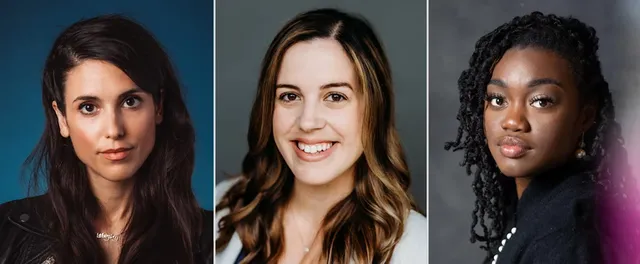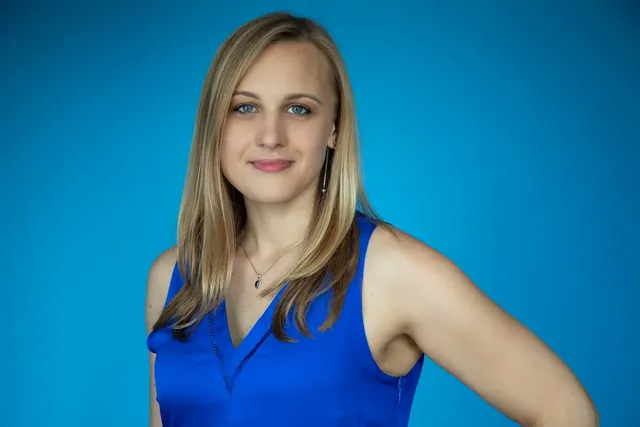Women Journalists on Protecting Their Mental Health While Covering Abortion Access

Women Journalists on Protecting Their Mental Health While Covering Abortion Access
On the evening of June 24, hours after the Supreme Court announced its decision to overturn Roe v. Wade, MSNBC correspondent and author Liz Plank tweeted, "Shout out to all the female journalists who are calmly reporting on their own disenfranchisement today." The message stopped my scroll in its tracks. It was an observation that I, a woman journalist myself, somehow hadn't stopped to consider yet.
I'd spent most of that day struggling to wrap my head around the news, reading up on the future of birth control, states with trigger laws, and which abortion funds were most in need of donations. Behind many of the stories offering me answers was a woman writer also dealing with the loss of constitutional protection for abortion.
In the two months since, I've spoken with seven women journalists who've been covering the fall of Roe v. Wade from various angles. Some are focusing on the legal implications of the decision, meticulously tracking the rollout of restrictions across the country, while others are exploring on-the-ground stories of abortion providers and the disproportionate effect on women of color. A few have covered abortion for years and saw the overturn of Roe coming far before Politico leaked the decision in May.
These reporters, who work for news outlets including NPR, Vox, and The 19th, graciously shared their time with POPSUGAR to unpack how they reacted to Roe's official reversal, their thoughts on journalistic bias, and how they've been protecting their mental health while covering diminishing abortion access as women. Join us in acknowledging their dedication to the beat by reading through our conversations ahead.

Sarah McCammon, National Correspondent at NPR
POPSUGAR: What has it been like reporting on abortion, an issue that so intimately impacts women?
Sarah McCammon: Covering this beat, I talk to people in a lot of difficult situations. . . . Many women I've talked to, they're very, very confident of their choice, but it's happening because either a pregnancy went wrong, a tragic diagnosis, or it just wasn't the right time to have a baby. I don't think anybody goes looking to have an abortion. You're talking about something very personal, sometimes emotional, sometimes connected to really loaded topics like family, relationships, love, sex, religion, and health. It can be a really wrenching subject to cover sometimes.
To do this kind of work, you have to be empathetic and compassionate, and I try to convey as much openness to the people I talk to. They're doing our listeners and me a favor to tell their stories, which are very personal and private. I'm very aware of that. As a human, I walk away from those interviews feeling for them. . . .
I have personal conversations with women I know who are wondering how this might affect them if they're trying to get pregnant and something goes wrong. All of that put together, you feel things. I'm a woman, and I've had two children. I know very intimately what it feels like to be pregnant, to worry about a pregnancy, and just to be in a woman's body. Again, I feel for the people that I talk to, and like any emotional subject that we cover as journalists, of course, it affects you.
"We're all human beings. In fact, I think you're a better reporter if you're a human being." — Sarah McCammon
PS: What's your take on journalistic bias in situations like these? Do you think it's possible to remain unbiased while discussing abortion access as a woman?
SM: I think that we, as an industry, have come to realize in the last few years that everybody brings their life experience, their identity, their personal history, and their personal feelings to their reporting. I don't think it's reasonable to ask anyone, regardless of what issue they're reporting on, to leave all of that at the door. We're all human beings. In fact, I think you're a better reporter if you're a human being.
The question is not, "Do you have an opinion about an issue?" because everybody does. The question is, "Can you report thoughtfully, thoroughly, and fairly?" That doesn't mean always giving equal weight both sides of every issue. . . . I think it's really important to try and understand why people bring different points of view to these issues, particularly like abortion. A lot of my coverage is focused on some of the religious and ideological underpinnings and some of the public debate around that. I think being curious about the whole spectrum of thought is important for covering it well and accurately.
PS: Is there an abortion-related story you're proudest of reporting on?
SM: I reported back in October, not long after SB 8 took effect in Texas, on concerns I was hearing from the medical community about what that would mean for the ability of care providers to treat patients in emergency situations. I think that prediction clearly has turned out to be the case. We've heard from many, many healthcare providers who have seen, and are seeing patients in horrific situations — everything from rape victims to medical emergencies — and are finding themselves with an increasingly difficult set of choices or no choices. My colleague Carrie Feibel and I have both reported on situations in Texas that match exactly what doctors predicted, which is patients experiencing miscarriages of unviable pregnancies and unable to get a termination, which is in line with the standard of care. . . .
The other one would be a story from about three years ago that I did about the rise of self-induced abortion. People were not talking about it at that time nearly as much as they are now, but it was something that was emerging as something that advocates were interested in and we're hearing more and more about it now. I always feel good when my reporting spots something before it's widely discussed. Not to say that I was the first person to report on either of those, but those are both subjects that we're hearing a lot more discussion of today than we were when I was reporting on them originally.
PS: Is there anything else you'd like people to know about what it's like to be a woman journalist right now?
SM: Anything that intersects with your identity in some way can be especially loaded and emotionally taxing to cover, but I also think it's important. . . . For me, I'm really grateful that I'm a woman, and that I can sit in a doctor's office with women, and talk about pregnancy with a lot of firsthand knowledge, as well as head knowledge. So many of the people I talk to for these stories are women — both patients and activists and advocates. . . . This is an issue where gender does matter, and there's a different kind of a connection between women when you're deep in an issue like this. I think it's helpful to me as a reporter.
